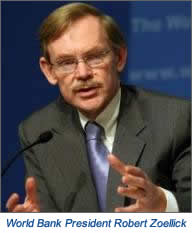
World Bank President Robert Zoellick made his first-ever visit to Yale on February 9 to have a public conversation about the world economic crisis, globalization and related topics with Ernesto Zedillo, Director of the Yale Center for the Study of Globalization, before a full house in the Luce Hall auditorium.
The two men have known each other for years, since Zoellick worked for passage of the North American Free Trade Agreement, supported by Zedillo when he was president of Mexico from 1994 to 2000.
To Zedillo’s question about the global economic crisis, “Where are we now?” Zoellick, president of the World Bank since 2007, replied, “We are in a multispeed recovery. The emerging markets have had pretty strong recoveries, and the question is leveling off so as to avoid overheating, inflation, asset price bubbles. In the case of the United States, while I believe there’s a reasonable recovery, there’s still going to be a serious problem in creating jobs, and there’s this big wave of deficit and debt. In the case of Europe, it’s a question of dealing with the sovereign debt crisis. For all these regions, there is the importance of focusing on the fundamentals of growth.”
He said the challenge is that policy makers in different countries see different issues as priorities.
He discussed the difference between the G-7, established in 1976 and representing the seven major capitalist economies, and the G-20, which was founded in 1999 and includes the major emerging economies. (He noted that it includes more than 20 countries.) “This is a tension you always see in the international system,” he said. “More people makes it more representative and therefore legitimate, but the more people, the harder it is to get things done. So one of the challenges for the G-20 going forward will be whether it will be a ‘talk shop’ or whether it will try to drive issues.”
Zedillo asked why it is so hard to make progress on global issues.
Zoellick replied, “We still live in a world of sovereign states. That means that governments are going to make decisions and have to sell decisions that reflect the sovereign national interest, but in a world that is interdependent and integrated. The first thing to do is avoid bad things. While we haven’t closed the Doha round [of free trade talks], we haven’t done things like in the ’30s in terms of trade protection.”
Addressing the trade imbalance between the U.S. and China, he said, “It comes down to the U.S. and China changing their consumption and savings balance.” He added that the old concept of the “Third World” is outdated. “Whether it be climate change of development or trade, we have very different emerging market economies. And I think to be successful [in these areas], one is going to have to have some of these emerging markets share the responsibility” for what happens.
As for current efforts to get the Doha round passed, he said, “I think it will depend heavily on the U.S. sharpening some of what it wants or needs to move forward and get political support, and it’s going to require some of the emerging market countries to be able to meet some of those needs. Now, the U.S. may have to do some cuts in other things, maybe farm subsidies. So I believe a deal is doable, [but] if the other guy is humiliated, or has nothing to go home to sell, they’re not going to sign up. So I tend to see these as multiple joint problem-solving exercises, where you’re trying to liberalize as much as you can, while dealing with everybody’s politics.”
